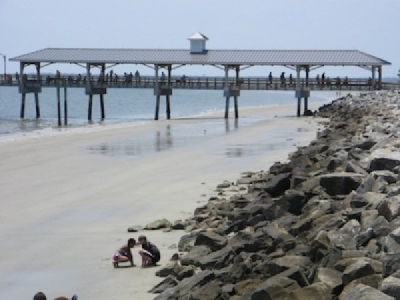
Posted on August 1, 2018
House and Senate negotiators agreed Thursday on a $2.4 billion package of long-term environmental investments, authorizing state borrowing to repair coastal infrastructure, fix up parkways and trails, shore up state dams and improve air and water quality.
The conference committee that had been working to reconcile House and Senate versions of the environmental bond bill since early last week filed its report (H 4835) with the House clerk’s office at 7:41 p.m. Thursday evening, early enough to allow the House to consider it during Friday’s formal session.
The House prevailed in talks over a Senate-approved statewide ban on single-use plastic bags, which was dropped from the final version of the bill.
Rep. William “Smitty” Pignatelli posted to Twitter a photo of himself and Sens. William Brownsberger and Anne Gobi handing the report to a clerk. “Didn’t get all that we wanted but extremely proud in the end,” the House chair of the Environment Committee wrote.
Pignatelli told the News Service the conference agreed to include all the House and Senate spending earmarks and grappled with some of the policy sections approved by one branch but not the other.
The compromise authorizes $225 million for “grant programs for land, soil, water and natural resource conservation; open space preservation; watershed remediation; coastal resource protection,” $150 million for air and water quality improvements and $100 million for coastal infrastructure and resiliency measures, including “seawalls, jetties, revetments, retaining walls, beach nourishment, living shorelines and other nature-based solutions.”
There is an $85 million authorization for repairs and maintenance to municipal and state dams, $45 million for remediation or removal of oil or hazardous materials and $50 million for Department of Fish and Game facilities, including $250,000 for the demolition of a boat ramp at Lake Chargoggagoggmanchauggagoggchaubunagungamaugg in Webster.
The bond authorizations in the bill are split into many local earmarks sponsored by reps and senators. The inclusion of a project in a bond bill, even if it is signed by the governor, does not guarantee that a project will occur since the executive branch can only advance a limited number of projects under the state’s annual borrowing cap.
The statewide ban on single-use plastic bags adopted by the Senate did not survive conference negotiations. Pignatelli said the conferees simply could not find consensus on the issue that has passed the Senate at least twice without the House following suit.
“We are very disappointed the legislature did not take action to ban single use plastic bags this session. Over eighty cities and towns have voted to ban these bags in their own communities, representing over a third of Massachusetts residents,” Emily Norton, Massachusetts chapter director of the Sierra Club, said in a statement. “Plastic bags are rarely recycled and often end up as litter in our parks, roadways and waterways, where they harm or kill wildlife and marine animals.”
The conference committee bill adopted the House language around climate adaptation, Pignatelli said, and directs the secretaries of environment and public safety to “coordinate efforts across the commonwealth to strengthen the resiliency of communities, prepare for the impacts of climate change and prepare for and mitigate damage from extreme weather events” and file a state hazard mitigation and climate adaptation plan every five years.
With the environmental bond bill now out of conference, the House and Senate are still negotiating on short-term rental regulation, health care, education funding, animal welfare and clean energy ahead of the July 31 end of formal legislative business.
Source: The Salem News





